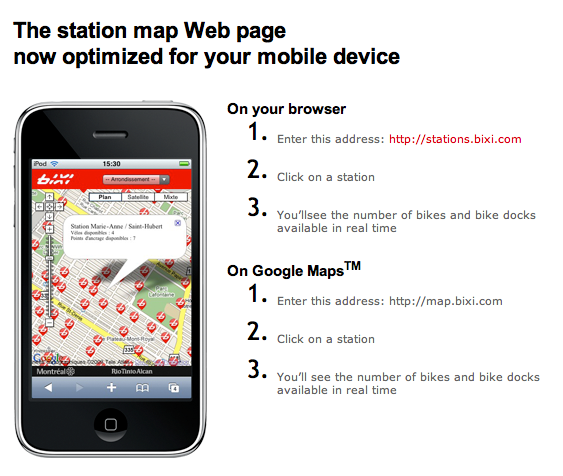LATITUDE & NEXT AMERICAN CITY
A few months ago, Latitude Research (in collaboration with Next American City), asked regular drivers in Boston and San Francisco to go car-free for one week and to rely on other forms of transit instead. Participants shared their experiences and ideas for improvement, suggesting opportunities to redesign the experience of going car-free (e.g. not owning a car) so that it’s more convenient, personalized and enjoyable—largely through the help of mobile information technologies. Key opportunity areas include:
- Apps that enable aspirations
- Collaborations between “competing” entities
- Better integrations of transit with other local information
- Apps that enable aspirations: make it easy to be good. Bixi is a bike-sharing system piloted in Montreal that’s been so successful other cities worldwide are beginning to adopt it. It’s flourished because of its ease of use, accessibility, and information transparency (not to mention low price point and high product quality). Users can return their bikes to any docking station, which are never more than 1,000 feet apart in the city. Bixi offers a smartphone app that tells users locations of the closest docking stations and the number of bikes and docks available there. Thanks in large part to real-time, mobile information, Bixi makes it easy for people to access bikes without pre-planning and without regard to their specific location.
Study participants felt that there were a number of inherent benefits to driving less, many of which aligned with their own personal goals—perks like good exercise, reducing one’s carbon footprint, feeling more immersed in their communities, or having more time to read or relax. People want to make choices that are good for themselves and for the environment (typically, the more incremental or low commitment, the better), and the hurdle to doing so is often just a matter of having the right information at the moment a decision is being made. This a clear opportunity space for mobile to fill; businesses can now offer people the opportunity to engage new identities, experiences, and values at little to no commitment or cost—by offering them the information they need to make these decisions in real-time. Accordingly, participants suggested apps that would help plan their routes easily and efficiently, but would also track progress toward their goals in terms of fitness achievements and positive environmental impact. Relatedly, there may be a role for apps with game elements that tap into people’s deeper, intrinsic motivations like doing good for society (e.g., a points system to track small sustainable choices tied to an online local leaderboard with the highest-scoring citizens).
View full report summary (InfrastructureUSA.org)
View full report (AmericanCity.org):
About Latitude
www.latd.com
“Latitude is an international research consultancy exploring how new information and communications technologies can enhance human experiences. Amidst a landscape of profound technological change, they consistently deliver next-generation insights and assist organizations in discovering and developing new opportunities.”
About Next American City
www.americancity.org
“Next American City is a 501(c)(3) nonprofit organization, dedicated to promoting socially and environmentally sustainable economic growth in America’s cities and examining how and why our built environment, economy, society and culture are changing. They achieve this goal through the publication of their quarterly magazine and interactive website, their emerging leaders program, events across the country, and advocacy on issues central to the future of cities.”
Tags: CA, California, Kimberly Gaskins, Latitude Research, MA, Massachusetts, Next American City







 RSS Feed
RSS Feed